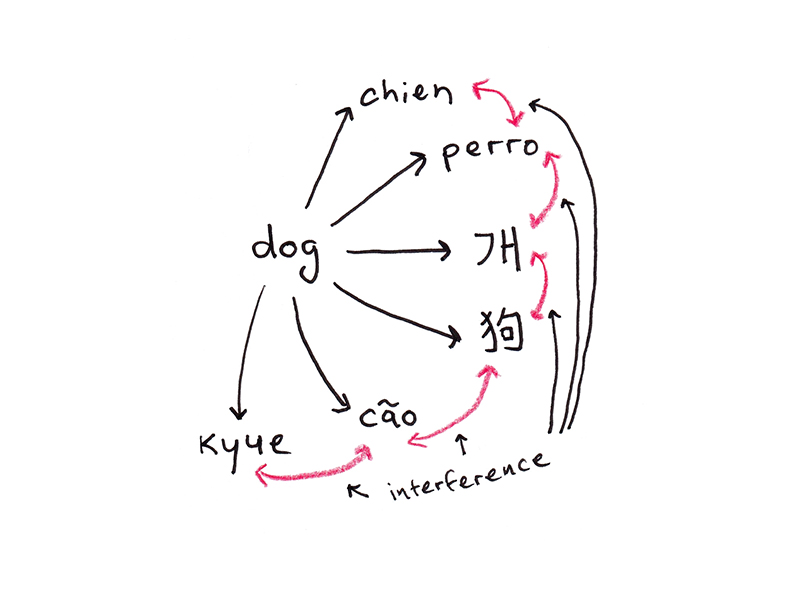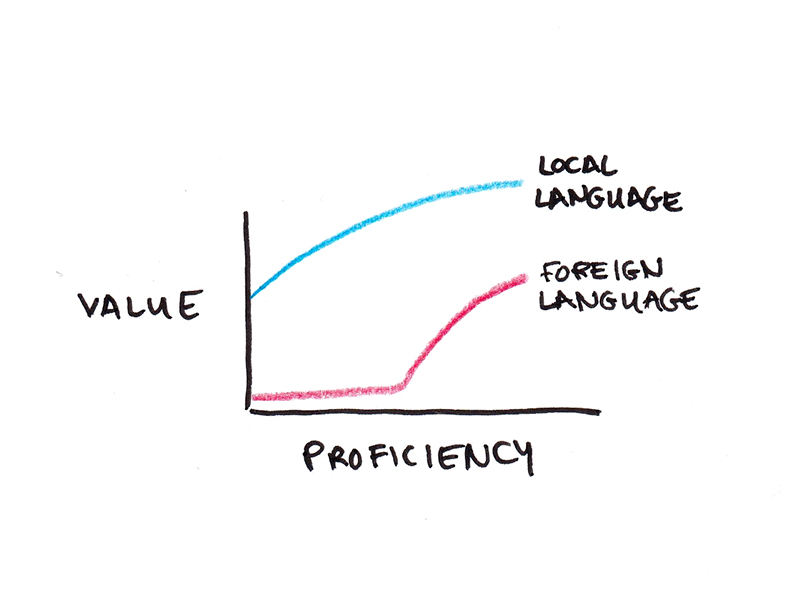I’ve lengthy been a fan of language studying. In faculty, I studied overseas for a yr to study French. Later, I spent a yr touring with a buddy selecting up Spanish, Portuguese, Mandarin Chinese language and a few Korean. I’ve discovered a little bit of my spouse’s native language, Macedonian, and labored by some phrasebooks whereas touring in Italy and Japan.

With advances in synthetic intelligence and machine translation, it’s simple to wonder if language studying nonetheless is smart.
My reply is: For monolinguals who reside inside their very own nation and don’t have any want to journey or immerse themselves in a overseas tradition—in all probability not. However I don’t assume the cost-benefit calculation has modified a lot for individuals who wish to or do spend appreciable time in one other tradition. Automated translators might assistance on a weekend cease in Paris, however they’re not an efficient substitute for studying the language should you plan to reside dans l’Hexagone.
As an alternative, I’d like to think about a distinct query. For a linguistic fanatic, does it make extra sense to study one language or many?
Talking A number of Languages is Comparatively Overrated
Given my very own investments in studying a number of languages, I’m going to play satan’s advocate right now and argue why, regardless of the seeming enchantment of talking a number of tongues, most individuals are in all probability higher off sticking to fewer.
1. Every language wants upkeep.
Benny Lewis was one in every of my first introductions to the web polyglot neighborhood, a gaggle of people who find themselves devoted to studying a number of languages. Benny speaks a couple of dozen languages, however some individuals have gained a level of fluency in thirty or extra.
Once I first met Benny, he had not too long ago completed a stint in (I consider) Poland and had picked up some Polish over his three-month keep. I congratulated him on including a brand new language to his repertoire, to which he replied, “Oh, however I’m not going to keep up it.”
To me, this appeared wild! How might he spend months studying a language and be so flippant about sustaining it?
Now, I notice I used to be being naive. Sustaining a language is tough work. Sustaining a number of languages is so much of exhausting work.
Languages are enormously depending on fluency, however fluency is the very first thing that degrades should you aren’t utilizing a language—even after intensive apply. Intensive apply over many years may help with this, as can intensive apply on high-frequency phrases. However the tip-of-the-tongue feeling that’s an rare nuisance for native audio system turns into a supply of fixed frustration should you don’t apply usually.
Sustaining a number of languages has all of the difficulties of sustaining every language by itself, in addition to including the issue of interference.
To oversimplify, language studying is essentially a means of constructing associations between an meant which means and a linguistic type that communicates that which means. However one of the crucial well-studied phenomena in reminiscence analysis is that whenever you affiliate one enter with two completely different responses (for instance, apple is each “pomme” and “manzana”), it creates quite a lot of interference.

Interference tends to be extra extreme with talking and writing than with listening or studying as a result of language → which means is a constant mapping, whereas which means → language varies relying on which language you’re attempting to supply. Interference will be overcome by common apply that alternates between languages. Nonetheless, one of these apply considerably will increase workload.
2. Decrease proficiency is much less useful in non-immersive contexts.
All else being equal, the identical period of time break up amongst a number of languages will end in a decrease proficiency than if that point was invested in a single.
Which means that the selection isn’t normally between talking one language completely or a number of languages completely; it’s between talking one language higher or a number of languages worse. My want to study a number of languages has positively drained vitality I might have spent mastering only one.
An statement I rapidly made after my language studying journeys was that whereas talking the native language was helpful at virtually any stage of means, talking a overseas language had restricted makes use of at decrease means ranges. The reason being easy: should you reside in an English-speaking nation, virtually everybody is aware of some English, so to speak with somebody in a distinct language requires you to talk that language significantly better than they’ll communicate English.1

This statement applies to extra than simply conversational means. Whereas residing in Spain, with the ability to learn menus and printed directions in Spanish (which requires a reasonably low stage of fluency) is enormously helpful. In distinction, exterior of Spain, the conditions that profit from understanding Spanish are issues like studying literature or watching worldwide information clips—issues that require a a lot larger stage of means to understand.
Now, the division of effort doesn’t suggest that the division of proficiency is equal. You might want to study a comparatively small set of phrases to maneuver from not realizing a language to having easy conversations, however to maneuver from intermediate to superior ranges of a language means massively increasing your vocabulary. How usually phrases are used falls off in frequency based on an influence regulation—with frequent phrases getting used very steadily and fewer frequent phrases getting used barely in any respect—however the effort wanted to study phrases is principally flat. Thus, going from intermediate to superior ranges of a language is far tougher than attending to easy conversations from scratch.
That distinction however, should you’re not planning on touring steadily, realizing a number of languages is much less helpful at house than being more adept in a single language.
3. A number of languages make cohesive social networks tougher.
Once I got here again from my yr overseas in France, I gravitated in the direction of different French change college students each due to my current cultural expertise and a want to apply French.

Nonetheless, after I got here house after spending a yr studying a number of languages overseas, I spotted it might be a lot tougher to do the identical factor with 4 languages. Discovering associates who communicate Mandarin, Korean, Spanish or Portuguese sometimes requires becoming a member of 4 fully completely different social teams.
Devoted occasions, like meetups for explicit languages, can get round this downside considerably, but it surely’s simply tougher to get constant apply in a number of languages with the frequency you may obtain should you give attention to a single language.
One of many key rationales for Vat and my no-English rule was that semi-monolingual social bubbles are likely to type naturally. When you transfer to a spot the place you don’t have a powerful grasp of the native language, it’s best to create a social community of people that can communicate your native language. This makes it a lot tougher to spend a big period of time utilizing the language you are attempting to study.
4. The bragging rights aren’t price it.
I bear in mind assembly a man in faculty who spoke three languages. Three! That was actually cool, I believed. Later, after I was in Europe, I met individuals who spoke 4 or 5. That was even cooler! So I used to be stunned to comprehend that I principally by no means carry up my year-long journey to study languages after I meet individuals. (Clearly, this weblog, which facilities round my studying initiatives, is completely different!)

A few of this could be due to upkeep complications. I haven’t spoken Korean in in all probability a yr, and whereas relearning is quicker than beginning recent, it’s in all probability going to take me at the very least just a few classes earlier than I can communicate it comfortably once more—and bragging about talking languages that you simply can’t instantly produce is fairly weak.
However the greater half is that bragging is usually overrated. Outdoors of job interviews or different social contexts the place itemizing your accomplishments is predicted, conspicuously citing private accomplishments shouldn’t be an effective way to win associates.
Thus, I feel any motivation to study a number of languages has to return from inside. When you’re simply doing it to appear cool, you’re in all probability higher off getting a tattoo.
Why May Studying A number of Languages Be Value It?
That one thing is overrated doesn’t imply it’s with out worth—simply that it’s seemingly price lower than the hype.
There are good causes for studying a number of languages, and if I had to return and do it once more, I’d nonetheless do the identical initiatives:
Every new language opens extra cultures and locations to you. The motivation right here is identical as eager to journey and study one language as a substitute of simply sticking together with your mom tongue. Vat and I began with eager to do a world journey—we added language studying in a while.
For brief-term journey, talking poorly is commonly ample. Even low ranges of means are sometimes appreciated by native audio system whenever you’re touring. Thus, in case your fundamental aim is to journey so much, studying quite a few languages poorly could also be extra helpful than mastering one.
You get a greater understanding of languages, generally. Metalinguistic consciousness is probably not your cup of tea, however I’ve discovered that studying a number of languages has given me a way more generalized image of languages and studying than I had after I had solely discovered French.
In fact, there’s nothing incorrect with studying a number of languages to a fundamental stage and specializing in making extra progress in a single. This was what I made a decision to do with Mandarin Chinese language after our journey—I’ve spent quite a lot of time attempting to get to an upper-intermediate stage in Chinese language whereas I’ve been comfortable to remain at a reasonably low stage with Korean and Portuguese.
Do you communicate a number of languages? Do you assume it’s higher to study one or many? Share your ideas within the feedback!
Footnotes
- I’d argue there’s an extra issue: The anticipated language of communication strongly shapes norms surrounding talking. As a white individual residing in Canada, the place the native languages are English and French, going as much as a Chinese language waiter in Canada and ordering unexpectedly in Chinese language includes some momentary awkwardness, although I hardly ever skilled such awkwardness whereas ordering in eating places in China.

